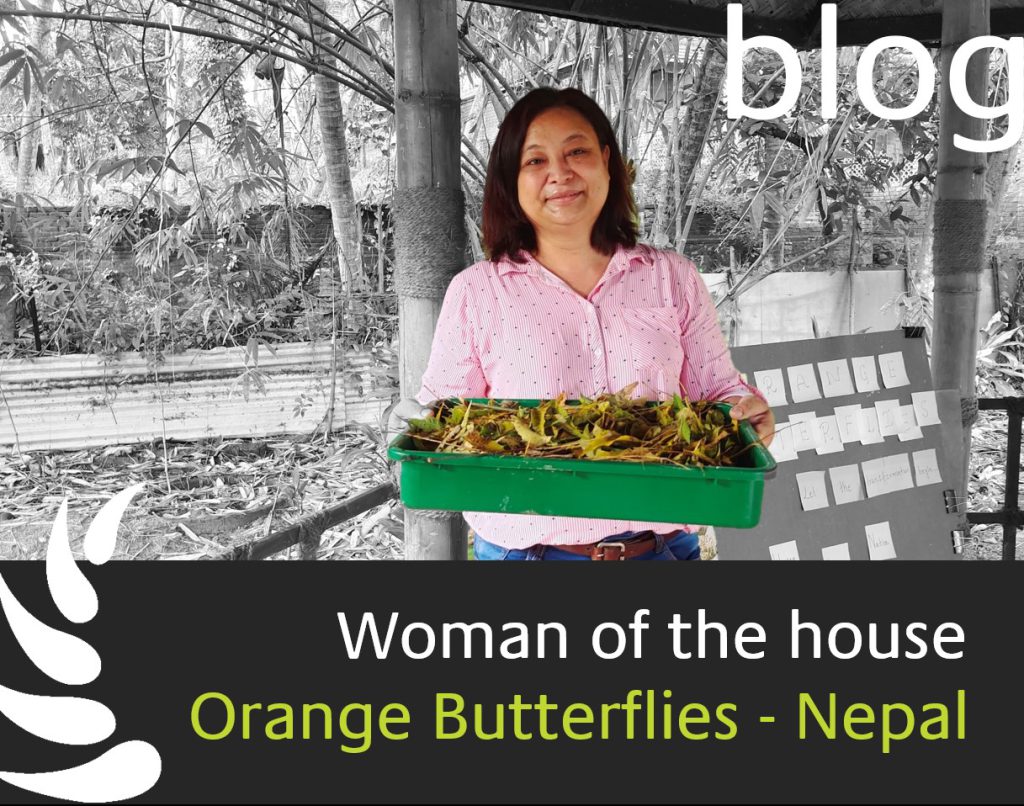Geeta Dangol Maharjan is from Nepal. She grew up in a Nevari family in Kirtipur, a town next to Kathmandu that is famous for its traditional beauty. Suddenly, there were bombs everywhere, and Nepal was no longer safe. The Nepalese Civil War (1996 to 2006) started due to political conflicts and left Nepal in a deep crisis which is still felt in many sectors. Unemployment, poverty, and inequality are the aftermath of this unrest. With her organisation Orange Butterflies, Geeta plans to create a change by empowering single women, who are often left behind.
woman of the house
Nepal is a strictly patriarchal country in which daughters are valued less than sons. My father wanted my mother to give birth to a son. Although she had always wanted a small family with only two children, my father insisted on trying until the first son was born. Thus, she was blessed with seven daughters, and I am one of them. Listening to my mother’s stories and observing my parents’ relationship, I feel sad about her being ill-treated and marginalized by her entire family. As a child, I often watched incidents of violent attacks, and I used to feel helpless. Once, my father threw an entire bowl of hot food at my mother just because the vegetable was not salty enough. There was a silence that built up between my parents due to financial dependency.
During my childhood, I never felt that my father was there for us. He never took responsibility for paying fees or visiting teachers. My mother used to send money with us to pay the fees ourselves. We were terrified of him. Yes, I could see he was working hard. But due to his violent character, we never had that father-daughter relationship, even when he became calm later in life.
One fine day, my mother’s sister-in-law suggested a business idea to my mother, and she advised her to move out. Finally, after four children, my mother spoke up and got us separated from the joint family. She had no education. However, she empowered herself to start a small retail business in a new locality. Slowly but steadily, the business took off. I could feel and see a change in the relationship between my parents. Suddenly, there were bombs everywhere; Nepal was not safe anymore. The Nepalese Civil War (1996 to 2006) started due to political conflicts. I was born in Kirtipur (City of Glory), an ancient city of Kathmandu Valley located in the southeast region, which used to be the safest place before the civil war. My parents sent me and my sisters to India for further studies. People across Nepal were moving to the capital city for safety.
I came back to my country in 2017, only to learn that the issue had worsened and almost 500,000 people were moving out of the country every year to foreign lands for low-paying jobs due to lack of skill and education. Many women were left behind with household responsibilities without any secure source of income.
This made me wonder: Why can’t we create jobs within our country? I have witnessed how my mother’s life changed after she secured her financial independence. She could decide everything for her children and family. She even became bold and taught us to become bold. I pondered over my mother’s story and could see that there were still many women who face the same issue: silence born of financial dependence.
Since 2017, I have been working with marginalized women to help them achieve financial independence. I could see the impact from my own story after I was able to secure a job and fend for myself, doing way better than the male cousins in our family. My father concluded that I was as able as a boy. He slowly stopped being violent. Today, I am running my own business and a non-profit organization for women in our community. Furthermore, I am taking care of my parents as the Woman of the House.
“Orange Butterflies” dreams of a future where all the marginalized women in Nepal receive equal opportunities to dream and achieve financial and social independence for a better livelihood.
We will provide equal opportunities to marginalized women through job-oriented skill development, advocacy, mentoring and other vocational trainings (such as website development, training on the share market, graphic designing, digital marketing, fashion technology, jewelry designing, handicraft, public speaking, etc.) so that they can have more opportunities in terms of work and participation in any sector.
We want to start an inclusive cooperative for both women and men. After training, they can either work with us or start their own venture. If they choose the latter, we’ll always be there for them as a support system. To lend a hand in their entrepreneurial journey, we will introduce a cooperative store to boost all our products with mutual benefit. Furthermore, to enhance the livelihood of marginalized women, we will facilitate marketing across Nepal for the products produced by them. The products will be bio-degradable, eco-friendly and made from natural raw materials. We are also promoting natural fiber produced from hemp, banana and jute, which are locally available in Nepal. They are durable and eco-friendly.
Today, my dad is the proud father of seven daughters who are no less than any of the men in our community. In fact, he is now supporting the cause I am working for.
NOTE THE DATES: on the 17th and 18th of December 2021:
Geeta as well as 15 other kantharis will share their gripping personal journeys and solutions for social issues that have affected them, with the public during kanthari TALKS.
Geeta will be speaking in the session about Peace and Empowerment on the 18th of December.
More details about her and the other speakers and the timings of the event that will be live streamed, can be found on http://www.kantharitalks.org/
Thank you for sharing this post and this link.



